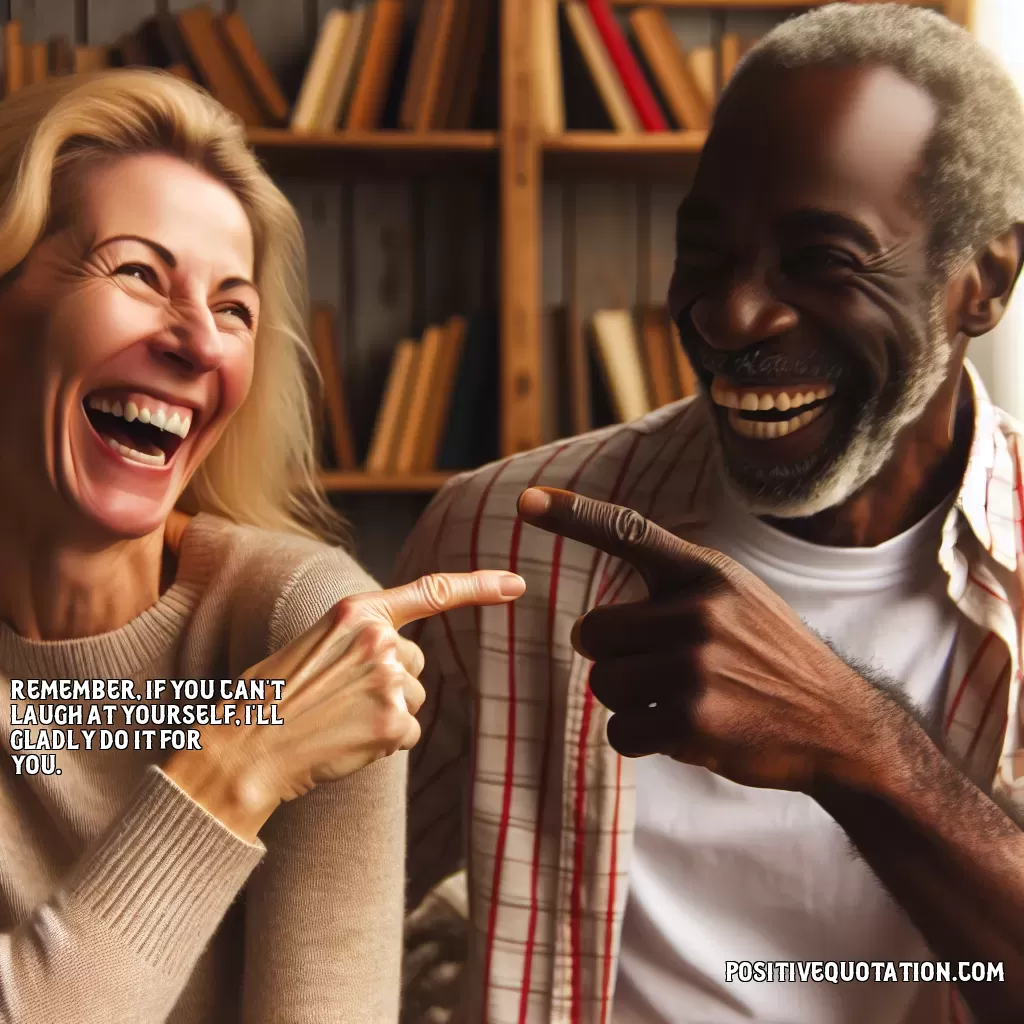
Remember, if you can't laugh at yourself, I'll gladly do it for you.
Author: Gael Greene
👁️ 12 views

Remember, if you can't laugh at yourself, I'll gladly do it for you.
👁️ 12 views
The quote, "Remember, if you can't laugh at yourself, I'll gladly do it for you," serves as a humorous reminder of the importance of self-deprecation and humility in human interactions. It suggests that the ability to laugh at oneself is a vital trait that fosters resilience, openness, and connection with others. When a person can find humor in their own shortcomings or mistakes, it demonstrates a level of self-awareness and acceptance that can disarm tension and unify those around them. The first part of the quote emphasizes the necessity of self-laughter as a coping mechanism. Life is filled with awkward moments and missteps, and it is often easier to navigate through these challenging instances when we can laugh about them. Laughter allows us to take ourselves less seriously, which can reduce stress and create a lighter atmosphere, making social interactions more enjoyable. It also invites others to share in our vulnerability, thereby cultivating deeper connections. On the flip side, the humorous implication in the second half of the quote—that someone else will take on the task of laughing at us if we don't—serves as a playful warning. It highlights the inevitability that we will be judged or teased by others if we are unwilling to embrace our own imperfections. Ultimately, this quote encourages a balanced perspective: by learning to laugh at ourselves, we take the power away from others to use our flaws as ammunition against us while simultaneously enhancing our ability to engage positively with the world around us. In essence, laughter becomes a bridge to greater self-acceptance and communal bonding.
Quote By: Gael Greene
Gael Greene, an influential figure in the world of food writing, was born on February 22, 1933, in Ann Arbor, Michigan. Greene's career began in journalism, but her passion for food and dining quickly propelled her into the spotlight as a celebrated restaurant critic and author. She is perhaps best known for her long tenure as the food critic for New York magazine, a position she held from 1968 to 1978. In this role, Gael Greene's keen observations and evocative writing style transformed the landscape of food criticism. Her reviews not only conveyed the tastes and experiences of dining out but also captured the vibrant culture of New York’s culinary scene during a time of immense change.
Throughout her career, Greene was recognized for her ability to engage a broad audience with her passionate prose, which often blended personal anecdotes with sharp critiques. She wrote extensively about not just the food itself, but also the atmosphere and the stories behind the restaurants she reviewed. Greene's flair for storytelling helped elevate the status of food writing, and she became known for exploring deeper themes such as desire, nostalgia, and the intimate relationship between food and identity.
In addition to her work at New York magazine, Gael Greene is the author of several books, including "Insatiable: Tales from a Life of Delicious Excess," which is part memoir and part gastronomical journey. In this book, Greene reflects on her experiences in the culinary world, highlighting her travels, encounters with famous chefs, and the evolution of her palate over the years. Greene's distinctive voice and perspective have made her a beloved figure among food enthusiasts and aspiring writers alike.
In the ever-evolving landscape of food journalism, Gael Greene's contributions stand out for their honesty and sophistication. Today, her work continues to inspire a new generation of food critics and lovers, underscoring why Gael Greene is considered a key player in the narrative of American culinary culture.